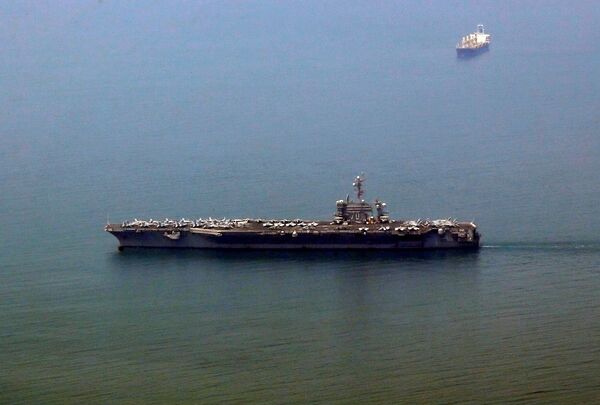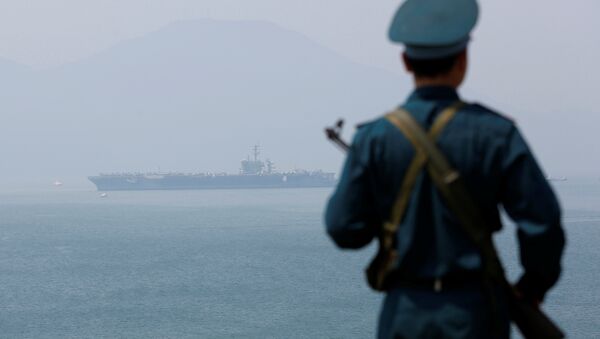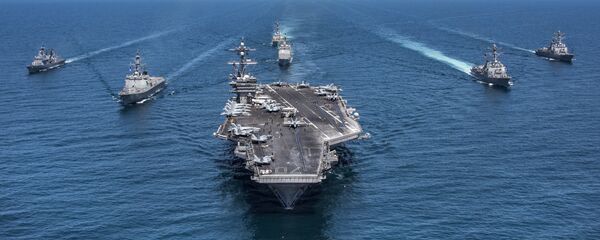Sputnik discussed this with John Short, political analyst, and Professor of Public Policy at the University of Maryland.
Sputnik: The USS Carl Vinson's presence marks the biggest US presence since 1975, causing some analysts to that this is a chance for the US to flex its military muscles back in Asia, what're your thoughts on that?
John Short: It allows the US to represent its quite vast naval power, its Carl Vinson is one of the supercarriers, one of the biggest aircraft carriers in the world, China has nothing equivalent to that, so it's a way of showing naval superiority, for the Vietnamese it's also a way to show their connection with the United States. Vietnam is involved in a very tense dispute over ownership of islands, access to resources in the South China Sea. China has made a giant claim over a huge part of the South China Sea that actually cuts into the exclusive economic zone of Vietnam and it takes over vital fishing interests and oil and gas reserves. So, Vietnam is looking for allies and a sort of defense system against the Chinese maritime claims; they were disappointed with the collapse of the TPP (The Trans-Pacific Partnership), they thought the TPP would connect more closely the US with Southeast Asia and Vietnam in particular. So I think the invitation to the US navy was part of an attempt by the Vietnamese to show the Chinese that the Vietnamese have allies.

Sputnik: What response can we expect to see from China? Obviously this is a little bit disturbing from their point of view and what consequences could this have on the relations between Beijing and Washington?
John Short: I don't think much of a change, China will probably say this is an aggressive act, there will be some statement from the ministry of Foreign Affairs, but they will continue the build up, the militarization of islands in the South China Sea. Despite US rhetoric to the contrary, China has advanced dramatically its territorial hold on these islands, it has been dredging up sand from the sea bottom and building aircraft bases, so I don't think that will stop, there's a sense in which maybe this is an empty gesture by the USA, I'm not sure what it can actually do to stop China, obviously, they haven't done anything so far. Carl Vinson sailing through the South China Sea is the most that the US does, it's the periodic acts of showing that the seas are open to navigation, but there's been really no direct counter to Chinese expansion in this area.
Sputnik: Some experts have said that the move illustrates Hanoi's complex relations with Beijing, what's your take on that? Will Vietnam side with US to challenge China?
READ MORE: Beijing Hopes US-Vietnam Ties to Enhance Peace After US Carrier's Historic Visit
Sputnik: It appears that Chinese commentators have used the Vinson's presence to demand a greater military build up in the South China Sea, how likely is Beijing actually to do that?
John Short: I don't think much, the last international diplomatic issue was the ruling by the International Court of Arbitration in the Hague which ruled in favor of the Philippines and against China's claim, but it was like tree falling in an empty forrest, nothing much happened in its wake, China continued its build up, America says it's for free navigation. I don't see any immediate solution to it, the only worrying thing is that a small scale incident at the local scale, like Chinese fisherman are pulled up by Vietnamese coast guards or vice versa, and it can escalate into something broader, or a US ship goes off corse, it's a bit of a flash point insofar as it could potentially be explosive, it doesn't necessarily have to be, but the broader context makes small scale incidents much more likely ignite a broader conflict.
The views and opinions expressed in this article are those of the author and do not necessarily reflect those of Sputnik.


